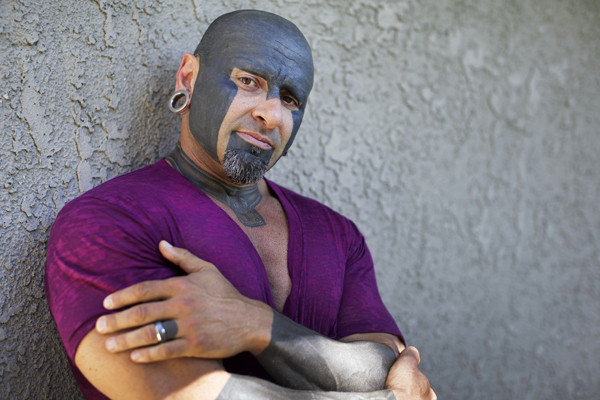Last summer, Tim Dax answered an ad on a casting website to costar in what was described as a desert adventure film.
This week, the Los Angeles actor learned that his work on the low-budget "Desert Warrior" had turned into the inflammatory 14-minute trailer for "Innocence of Muslims." Dax and his "Desert Warrior" costars are at the center of violent outbursts across the Middle East after their work was repurposed into an anti-Muslim movie that caught the world's attention after it appeared in an Arabic-language version on YouTube.
Dax's experience is an extreme example of the vulnerability of actors and crew members trying to cobble together a living working on ultra low-cost productions. His work has been seen by millions, but it is otherwise no different from the work done by hundreds of other actors and crew members taking jobs like the one Dax took on "Desert Warrior."
TIMELINE: 'Innocence of Muslims' unrest
Desperate for work and hungry for fame, local actors and technicians find themselves with fewer opportunities as the economy has slowed, studios have begun producing fewer films and TV shows, and more production work has fled California for states with better tax breaks.
That has meant a rise, though, in the number of movies produced under the Screen Actors Guild's "ultra low budget" category for films under $200,000. Production for such movies has jumped 43%, to 645 in 2011 from 451 in 2009 and is expected to continue growing, according to Hollywood's largest talent union. And many more low-budget movies, like "Desert Warrior," are made outside the jurisdiction of the industry's labor unions and cast not through Beverly Hills talent agencies but via online services such as Craigslist and Backstage.com.
"This is one of the textbook examples of why it's important to work under a union contract,'' said Duncan Crabtree-Ireland, chief administrative officer and general counsel for SAG-AFTRA, the Screen Actors Guild-American Federation of Television and Radio Artists. "Actors are not lawyers. They don't necessarily think about every possible way in which someone may misuse a performance. That's one of the benefits of working under a union contract, because it prevents that sort of abuse."
The proliferation of cheaply made features has been accelerated in part by the increasing availability of digital equipment, which makes it possible for producers to shoot their own movies with small crews. In 2005, in response to growing demand from their members, the guild created the ultra low-budget category. According to SAG rules, producers must pay actors on such a film $100 a day, provide meal breaks and adhere to standard union agreements about issues such as nudity and access to a full script.
Two people who worked on "Desert Warrior" have said that they were given a few script pages at a time and that they thought they were making a harmless historical drama.
"It was supposed to be about ancient warriors," said Dax, who has also appeared in an episode of "CSI: Crime Scene Investigation," music videos and adult films. Dax worked for a week and half, at a rate of $75 a day on an amateurish low-budget set tucked into a Monrovia strip mall, on what was described as a desert adventure film. "I was just happy to be involved with anything that has to do with acting, even though it was horrible."
"A lot of actors are taking these jobs because they need the job,'' said Monika Mikkelsen, a casting director in Los Angeles who mostly works on low-budget features. "If it's a student film or a low-budget feature, they can get footage for their reels that gets them more work. It's also a great way for them to meet up-and-coming directors who are making their own calling cards in their low budget films."
Gary Marsh, president of Breakdown Services, a Los Angeles-based company that operates Actors Access, a website where actors can post photos, resumes and demo reels and view casting notices, said his site gets as many as 25 casting notices a week for low-budget projects. (Two actors on "Desert Warrior" said they saw a casting notice for the project on Actors Access, among other sites, but Marsh says his company has no record of such a listing.)
"Digital technology has made it more accessible for more people to create their own films,'' Marsh said. "Everybody is trying to get work to prove they have the ability to either act, direct or write a story."
Such films sometimes end up at festivals and help launch the careers of stars such as Demi Moore andViggo Mortensen, which encourages actors to hope they may similarly be discovered while working for little money in sometimes poor conditions.
Shirly Brener, 35, of Lake Hollywood has worked steadily as an actress both in the U.S. and in Israel, with featured roles in a number of relatively big-budget movies, including "Righteous Kill" withRobert De Niro. She works only in union films but often ones that cost less than $1 million to make. In an independently financed, low-budget drama she recently completed, called "Touched," Brener plays a woman struggling with bipolar disorder, a role she hopes will offer her a chance to break out.
"It's often a good opportunity for somebody like me who hasn't had a lead in a big studio film to get a meaty part and play really challenging roles," Brener said. "Had that been a studio film, the part would probably go to Charlize Theron or Angelina Jolie."
Vic Polizos, a veteran film and TV actor with more than 85 credits to his name, took a role last summer in a low-budget movie called "Stealing Roses" starring John Heard, a well-regarded film and TV actor. Although he was paid only about $300 for three days' work, he said he took the part to work with some high-profile actors and in hopes that the picture might be noticed at film festivals.
.gif)




.jpg)


